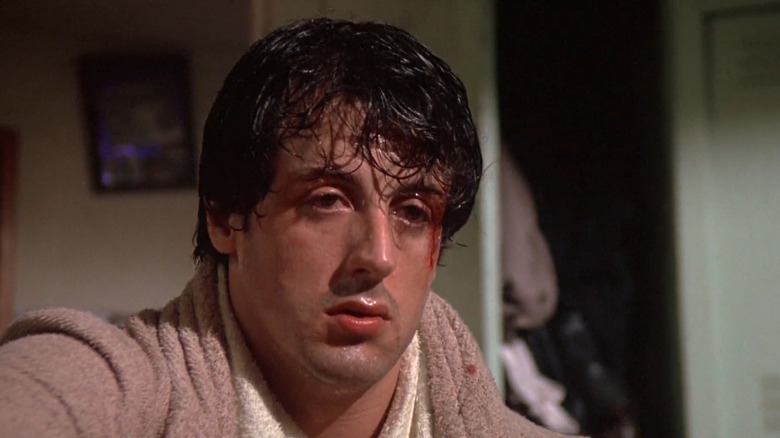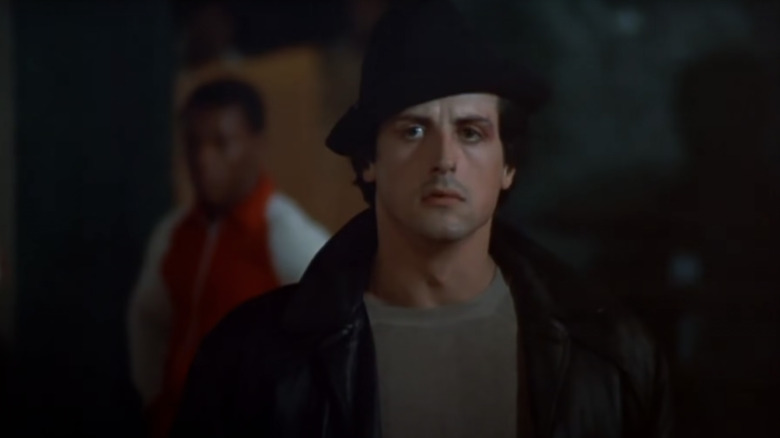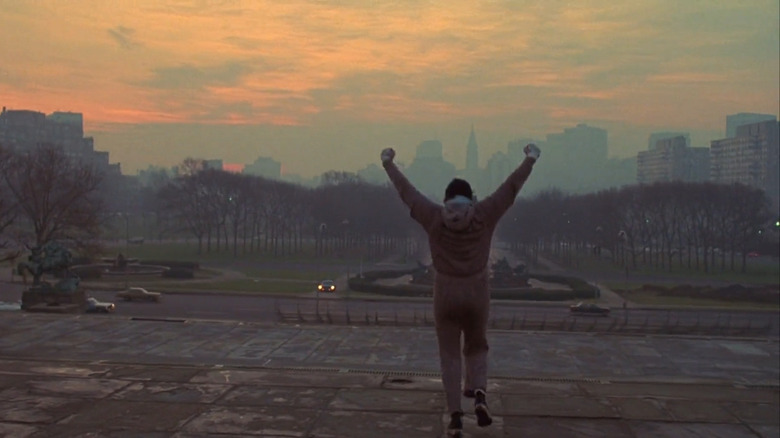The Studio Didn't Want Sylvester Stallone To Lead Rocky
"Rocky" is one of the most popular sports movies ever. Focusing on a simple man from the wrong side of the tracks who achieves his seemingly impossible dreams, the movie had a winning formula from the beginning. After the film's successful release in 1976, Rocky Balboa became a symbol for underdogs everywhere, and Sylvester Stallone became one of Hollywood's most popular action stars.
After "Rocky," Stallone was widely accepted as a leading man, especially if the role called for bulging biceps and a ridiculous amount of bullets, and he played these roles for decades. It might seem like this guy came out of nowhere and took Hollywood by storm, but Stallone fought for his time in the spotlight.
Before entering the ring as The Italian Stallion, Stallone was a broke guy in a sleazy Hollywood apartment, who was struggling to survive. Luckily for the young Stallone, he'd written a highly sought-after script about an underdog southpaw with a role designed to make him a star. Studios were interested in Stallone's screenplay, but they weren't interested in casting an unknown actor like Sly in the starring role. As reported by The New York Times, Stallone went up against Hollywood heavyweights and fought his way into the ring of stardom.
The ultimate underdog
Before "Rocky," Stallone had $106 in the bank, a rundown apartment in Hollywood, and a baby on the way. An average person with an everyday job might try to get a second job or pull in some overtime, and try to skirt by, but Sly is not an average person. After watching a fight between Chuck Wepner and Muhammad Ali, Stallone was inspired and cranked out an Academy Award-winning script. Stallone recalled the process in a 1976 interview with the New York Times:
"I was watching the fight in a movie theater and I said to myself, 'Let's talk about stifled ambition and broken dreams and people who sit on the curb looking at their dreams go down the drain.' I thought about it for a month. That's what I call my inspiration stage. Then I let it incubate for 10 months, the incubation stage. Then came the verification stage, when I wrote it in 3 1/2 days. I'd get up at 6 A.M. and write it by hand, with a Bic pen on lined notebook sheets of paper."
The script was a hit with Hollywood, and Stallone was offered as much as $265,000 for it. Despite facing financial ruin, Stallone refused the offer because the studio wouldn't agree to cast him in the lead role:
”I never would have sold it. 'I told my wife that I'd rather bury it in the back yard and let the caterpillars play 'Rocky.' I would have hated myself for selling out, the way we hate most people for selling out. My wife agreed, and said she'd be willing to move to a trailer in the middle of a swamp if need be.”
Instead, Stallone avoided the swamp, struck a deal with United Artists, and became a Hollywood leading man.
'A totally unmarketable person'
"Rocky" was filmed in 28 days, on a shoestring million dollar budget, and was expected to earn a modest $40 million dollars. Instead, the indie sports drama grossed $117 million, spawned 5 sequels and 3 spin-offs. In addition to earning the leading role, Stallone pocketed a much-needed $2.5 million from the film, and his life changed forever. "Rocky" proved Stallone had Oscar-winning writing abilities and leading man qualities, both of which he has used to have a long and successful career in Hollywood.
For most audiences, the man who penned and portrayed Rocky and Rambo, is a larger-than-life figure, but Stallone doesn't see himself that way. Back in 1976, Sly told The Times that there are plenty of other people just like him, who are never given the chance to express their creativity:
"If nothing else comes out of that film in the way of awards and accolades, it will still show that an unknown quantity, a totally unmarketable person, can produce a diamond in the rough, a gem. And there are a lot more people like me out there, too, people whose chosen profession denies them opportunity."
Maybe Stallone doesn't recognize his unique, creative abilities, maybe he just got lucky and appeared in Hollywood at just the right time, or maybe The Italian Stallion is a classic character because he represents the dreams within all of us that we have yet to achieve.


